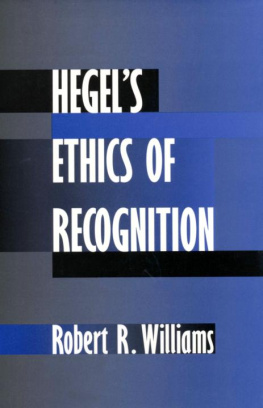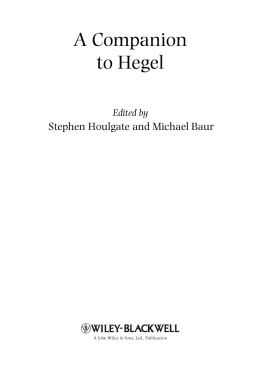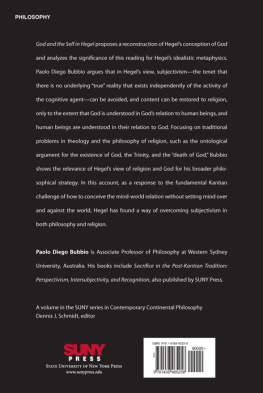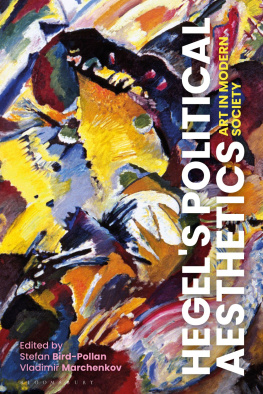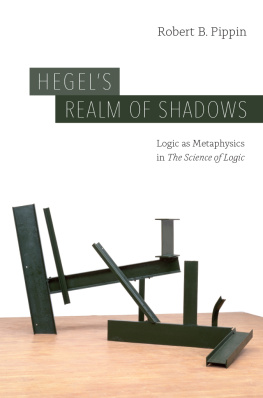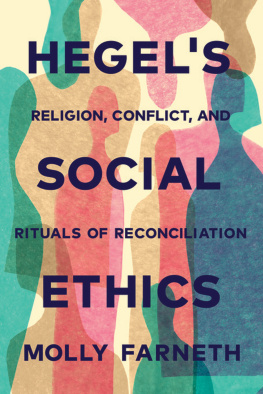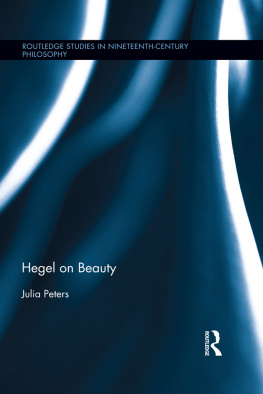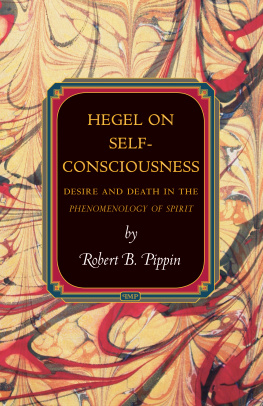Robert R. Williams




For Irma, Diana, and Daniel
Love is the consciousness of my unity with another so that I am not isolated by myself but gain my selfconsciousness only in the renunciation of my independence, and by knowing myself in relation and union with another.
Hegel, Philosophy of Right


With over ten thousand books and articles on Hegel, could there possibly be any justification for yet another, long book? I must leave the answer to this question to the reader. But, as far as I know, no one else has done what I propose to do, namely, examine Hegel's concept of recognition, track it from his early manuscripts into his mature thought, including the only recently available transcripts of his lectures on the Philosophy of Right, and discern how it informs his philosophy of spirit, especially his ethical and social theory. My thesis is that recognition (Anerkennung) is not only the existential phenomenological shape (Gestalt) of the concept of freedom but also the general intersubjective structure and pattern of Hegel's concept of spirit. As such it provides the ontological deep structure of his philosophy of spirit, practical philosophy, and account of ethical life (Sittlichkeit). Recognition is immanent not merely in Hegel's account of the institutions of abstract right (property, contract, and punishment), of family, civil society, and state, but also in his account of the virtues, such that all virtues are social.
In my opinion the topic and theme of recognition is both important and yet largely ignored, not only in English-speaking Hegel scholarship, but, with few exceptions, in German scholarship as well. Jurgen Habermas asserts that recognition is an important counterdiscourse of modernity in which Hegel presents an inclusive reason open to and mediated by otherness. According to Habermas, inclusion here is more than a disguised form of exclusion. There is much truth in what Habermas says. However, not even Habermas sufficiently appreciates the importance of recognition for Hegel, particularly for understanding his ethics. In my view, recognition is more than a minor theme of the so-called youthful Hegel that later becomes subordinate to metaphysical ideal ism. I agree with Habermas that recognition is a promising path for ethics and social philosophy, but I deny his contention that it is a path that the "mature Hegel" did not take. I will show that recognition continues as an important operative concept and theme in Hegel's mature philosophy of spirit.
This is not to deny or minimize the importance of the logic or the categorical ordering of the Philosophy of Right. Nevertheless, after examining the recently available lecture notes on Hegel's Philosophy of Spirit (1825) and the seven different lecture series on the Philosophy of Right that Hegel gave between 1817 and 1830, I believe that recognition continues to be an important, largely ignored theme and concept, the existential-empirical dimension of Hegel's concept of freedom. These recently available materials from Hegel's lectures, many of which were previously unpublished, make it possible to understand Hegel's philosophy of spirit better than ever before, and demonstrate the continuing importance of the concept of recognition in Hegel's mature thought. The following study examines the significance of recognition for understanding Fichte's and Hegel's concepts of freedom and their ethical thought. Mutual recognition is a major factor in Hegel's development of a social reason and rationality; it is an operative concept in Hegel's constructive philosophy of spirit and ethical thought. As will be shown, the question and possibility of ethics for Hegel turn on the possibility and significance of reciprocal recognition. This issue remains a controversial one, particularly in the French reception of Hegel and its aftermath.
This project of studying recognition originated on a Fulbright leave in Germany, where I first became acquainted with Ludwig Siep and Edith Ddsing and their work on recognition. It continued in my earlier book, Recognition: Fichte and Hegel on the Other. That work evoked the interest and criticism of several people, including H. S. Harris and Stephen Houlgate. I am indebted to Houlgate for his criticisms of that earlier work and for the invitation to present a paper on Hegel's theory of punishment at a Hegel conference sponsored by DePaul University in 1994, where I became acquainted with the work of other Chicago Hegelians: Ardis Collins, John McCumber, and Robert Pippen. This paper was an early draft of chapter 8 of the present work. I am further indebted to Houlgate for his criticisms and suggestions concerning the corporations as a possible solution to the problem of poverty (chapter 11).
This book was written while on a sabbatical leave from Hiram College. I also wish to acknowledge the support of a summer fellowship from the National Endowment for the Humanities. I want to express my gratitude to Peter C. Hodgson for his encouragement of work on Hegel and for making available to me a prepublication version of his translation of Hegel's 1817 lectures on the Philosophy of Right, which has since been published by the University of California Press as Hegel's Lectures on Natural Right and Political Science. I wish to express my appreciation to Daniel Breazeale for his thoughtful, critical review of the manuscript, and for helpful suggestions that stimulated revi sions, especially in my account of Hegel's relation to Fichte. I am also grateful to Tom Rockmore and Thomas Bowen for their criticisms and suggestions and to Ludwig Siep for his encouragement of the project. They have all contributed to making the manuscript a better one; none of them is responsible for the defects that remain. A further word of acknowledgment is due to my students, from whom I have learned much. Finally a word of thanks to my family, who patiently endured my apparently endless ordeal of writing and revising, and whose devotion to music provided me not only with aesthetically pleasant background but with more enjoyable times.
Shaker Heights, Ohio
Robert R. Williams



Introduction
The earlier study demonstrates the existence of a concept of intersubjectivity in German idealism and explores convergences between Hegel and Husserlian phenomenology on the topic of intersubjectivity. However, it is restricted to Hegel's Jena writings, including the Phenomenology of Spirit (1807), and to defending Hegel against charges that his thought violates intersubjectivity and difference by reducing the other to the same.

